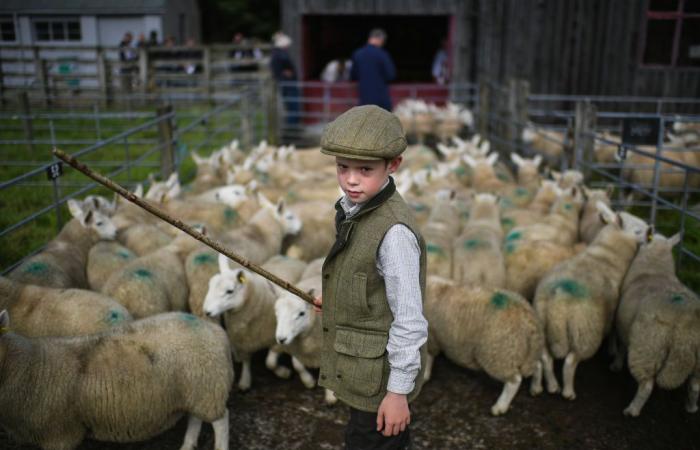Trust that progressive farmers could successfully transition between the two systems without their income disappearing.
And trust that the budget would remain stable in real terms, or even increase to meet the targets needed to transform the British countryside. At this point, it is important to note that although the old CAP budget of £2.4 billion may seem large, it actually pales in comparison to the scale of the transformation needed. The total budget for agriculture, food and nature in the UK is roughly equivalent to that of the Manchester Health Trust.
We believed that the budget would not only remain stable, but would eventually increase to support our national targets and legal commitments on biodiversity and climate change. No one has even bothered to calculate this increase, but the estimates I have heard vary between £4 billion and £10 billion a year to transform Britain's landscapes. This funding would not be used to “subsidize” agriculture as in the past, but to cover the costs of nature restoration.
We believed the government would honor its promises and align its other policies, including, crucially, trade deals. If we impose stricter environmental standards on British farms, we must also protect them from unfair competition from foreign producers who do not respect these criteria. Otherwise, it would amount to complete hypocrisy.
Above all, we trusted that the government would support us in our efforts to accomplish what would once have been seen as non-agricultural tasks — including nature restoration, combating climate change and managing downstream flooding.
Every one of these promises has been broken over the past four years.
Old systems were rapidly being scaled back, and the budget announced this month further accelerated this process by limiting payments, meaning most farmers will not receive the money they were promised and allocated for this year .
And worse, the new systems were slow to emerge, and due to shortages of staff and expertise in government agencies, thousands of farmers were unable to benefit from them. Over the past financial year, underspending on these new systems reached £358 million, and some estimate that figure could double this year. This means that to date, hundreds of farmers have submitted their nature restoration projects, but have been rejected or excluded from the new schemes. The economics of this situation are catastrophic, with mountain farmers' incomes having fallen by at least 38% due to this failed transition. This waste is a tragedy, depriving the British countryside of valuable opportunities for ecological restoration.
The budget has remained at £2.4 billion, but with inflation it is now around 40% less in real terms than when we were still in the EU. This is a considerable reduction in actual funding. And that 2.4 billion figure means nothing if farmers can't actually access it because of administrative bottlenecks.
British farmers have also been seriously undermined by the trade deals signed by the Tories with countries like Australia, Canada and other nations, which have abandoned any form of protection for our farmers. Today, a foreign producer can not only produce food more cheaply outside of UK regulations, but they can also sell their products on the UK market. It is difficult to imagine a more unfair trading system. This system favors the less sustainable foreign farmer over the more environmentally friendly British farmer — and leads Britain to import ever more cheap food from abroad, often processed and labeled as ” British” in supermarkets. While our moral principles apply domestically, they are completely ignored when it comes to imports. Every Prime Minister after Brexit promised us this wouldn't happen — yet it did.
But it’s not just about the well-being of farmers. What you need to understand is that it is you and your family who are at risk of going hungry in a crisis, not the farmers themselves. What we really need to worry about is that we depend on a highly vulnerable “just-in-time” food system that is completely ill-suited to an increasingly fractured geopolitical world. Donald Trump advocates an “America First” policy, and he is not the only one to adopt a protectionist posture. The Chinese, Russians, EU and other countries are securing their food supplies in anticipation of scarcity. As for us, our policy seems to be limited to the simple notion of “let Tesco do its thing”. This is extremely imprudent in a world where the security of global supplies is no longer guaranteed.
Of course, no one is suggesting that the UK should adopt a completely closed food system — it would be absurd to grow bananas here. But there must be regulatory fairness and appropriate support between UK farmers and imported products. Currently, UK farmers are at a significant disadvantage compared to their EU and US counterparts in terms of trade support and protections.
And all this is happening while supermarkets openly exploit British farmers, using imports of produce we could easily grow in our own fields to manipulate prices. Farmers, in this situation, are almost defenseless against these practices.
All of this has been made worse by a series of absurd offset schemes that allow other companies to shift their carbon footprints onto farmland, thereby inflating its value and undercutting farmers. Sectors such as construction and pension funds have hidden their money in land, using this asset as a means of tax avoidance – which has caused the price of land to explode well beyond its agricultural value, without the budget does not take this into account.
The reality of the “new deal for farmers” has been a succession of deceptions. After twenty years of environmental rhetoric and criticism of farmers, Britain has failed to offer a real prospect for the majority of farmers. Most of them have been forced to return to a heavily production-oriented model. And yet the environmentalists who led the attacks on old production subsidies appear to have disappeared or lost interest as the bold new world they had imagined has not materialized, leaving their former allies — farmers — in dire straits.
“The reality of the 'new deal for farmers' has been one scam after another.”
The farmers who never believed a word of it, the bitter skeptics who focused on productivity growth, were proven right, while the idealists like me were left in the position of naive ones. And to make matters worse, the Labor Party doesn't even want to acknowledge what it has destroyed. Over the past few months, the promises themselves have evaporated, as if the last twenty years of talk of change never happened. The bold environmental commitments the Prime Minister made at COP29 are now in vain until a real transformation of British agriculture takes place.
The Labor Party budget has created a storm around the Farm Property Exemption. The so-called “family farm tax” appears to have touched a nerve with many people, as it is deeply unfair and provides a convenient pretext for the right-wing press to criticize the government.
It's probably true that with good estate planning and an expensive tax advisor, most small farms can avoid a lot of this financial pain. But that's not really the point. The budget only makes sense as a short-term tax grab. Taxation should distinguish between working farmers and those seeking to avoid taxes. Of course, we must attack the large properties, but targeting farms that are struggling to survive is cruel. Labor should distinguish between land sold to enable its owners to make a profit and land whose value is inflated and which often creates little or no wealth for those who hold it for cultivation. After all, land is not money.
The budget is part of no coherent approach to building a better rural landscape, viewing farmers solely as a source of taxation. Any progressive vision for rural Britain needs thousands of farmers as agents of change – which is impossible when they are under enormous financial pressure. By reducing support for farmers, the government is also reducing the amount of “public goods” in the country – which translates into fewer hedges, fewer wetlands, fewer birds and fewer insects. This is deeply counterproductive.
Many environmentalists have completely misjudged this issue. As less and less taxpayer money goes to farmers, the government loses more and more leverage over how they manage their affairs, and its right to ask them to pursue public interest goals. diminishes, in favor of the search for their own interest.
One day the government will have to come back to the farmers and rebuild this agreement. And when that happens, most of them won't play along. Many will turn to the populist right, as happened in the United States; they will say that if progressives can't deliver anything better, they might as well vote for those who will cut their taxes. You either believe that politicians can find the funding for progressive change and deliver on their promises over time, or you don't. And for most farmers, the past few months have shaken that belief — both Labor and the Tories bear some responsibility.
Each field will now have to be exploited more intensively and considered as an asset. The progressive, green dream for British agriculture is well and truly dead.
***
James Rebanks' new book The Place of Tides is published by Allen Lane.
Comments on the French edition






